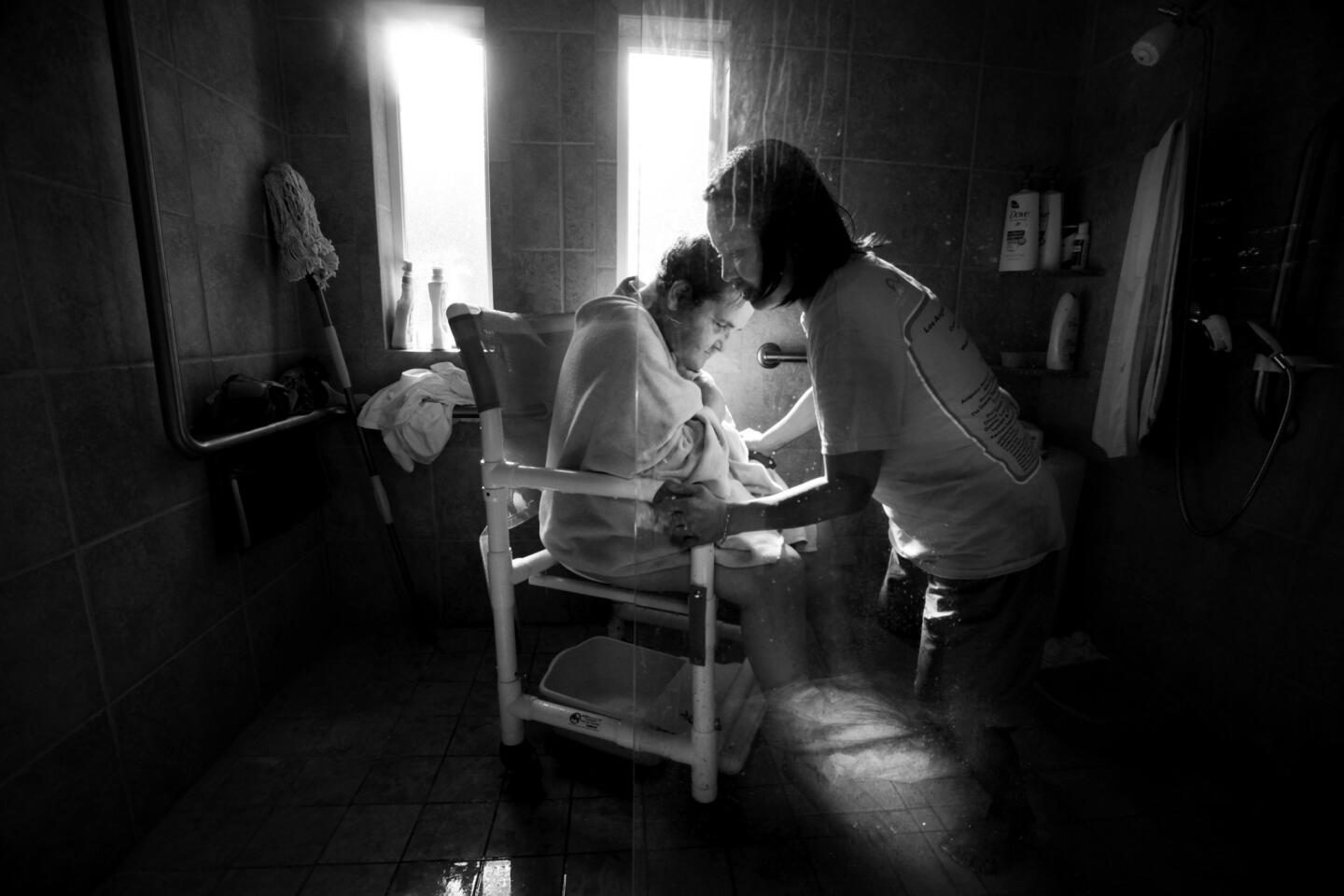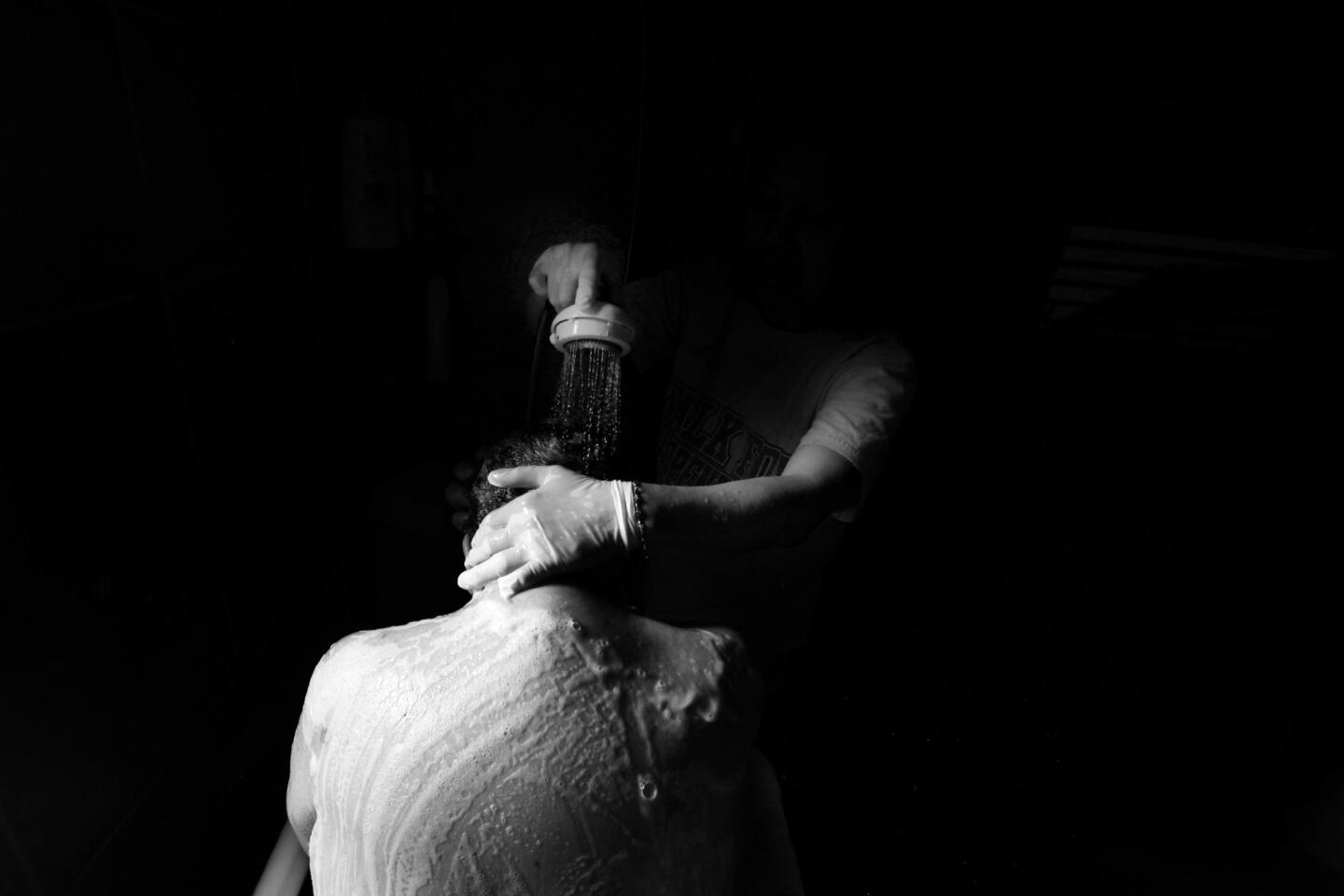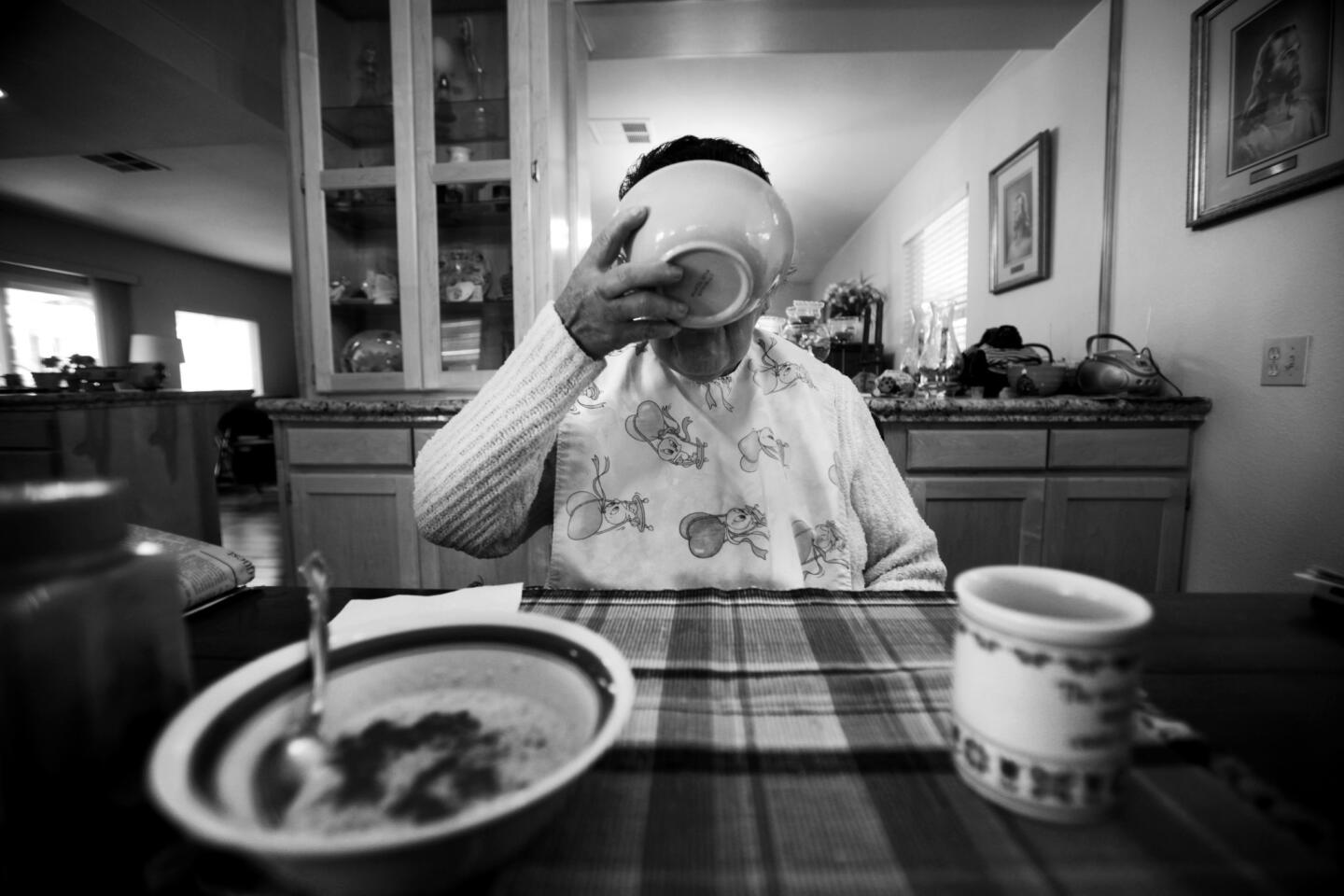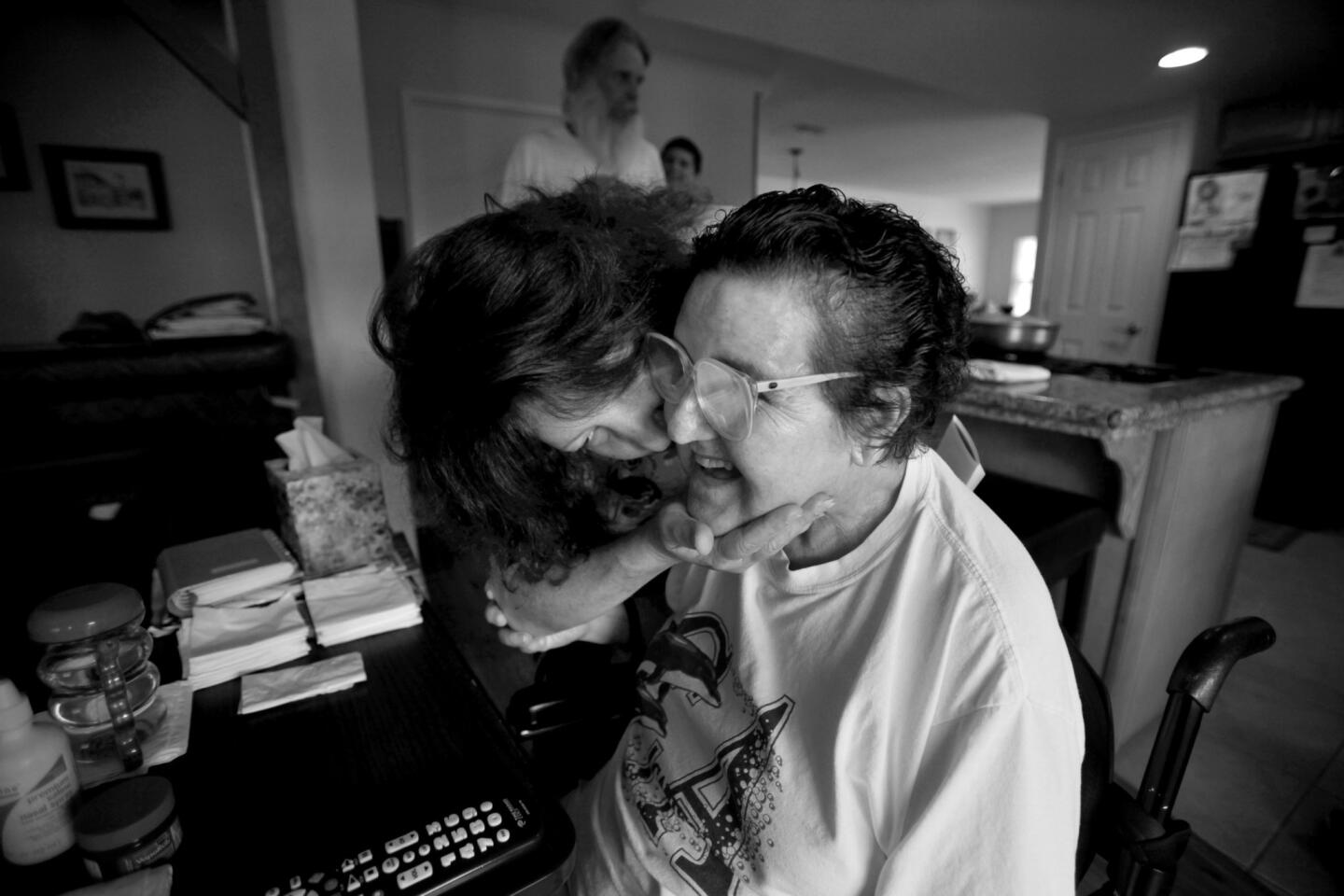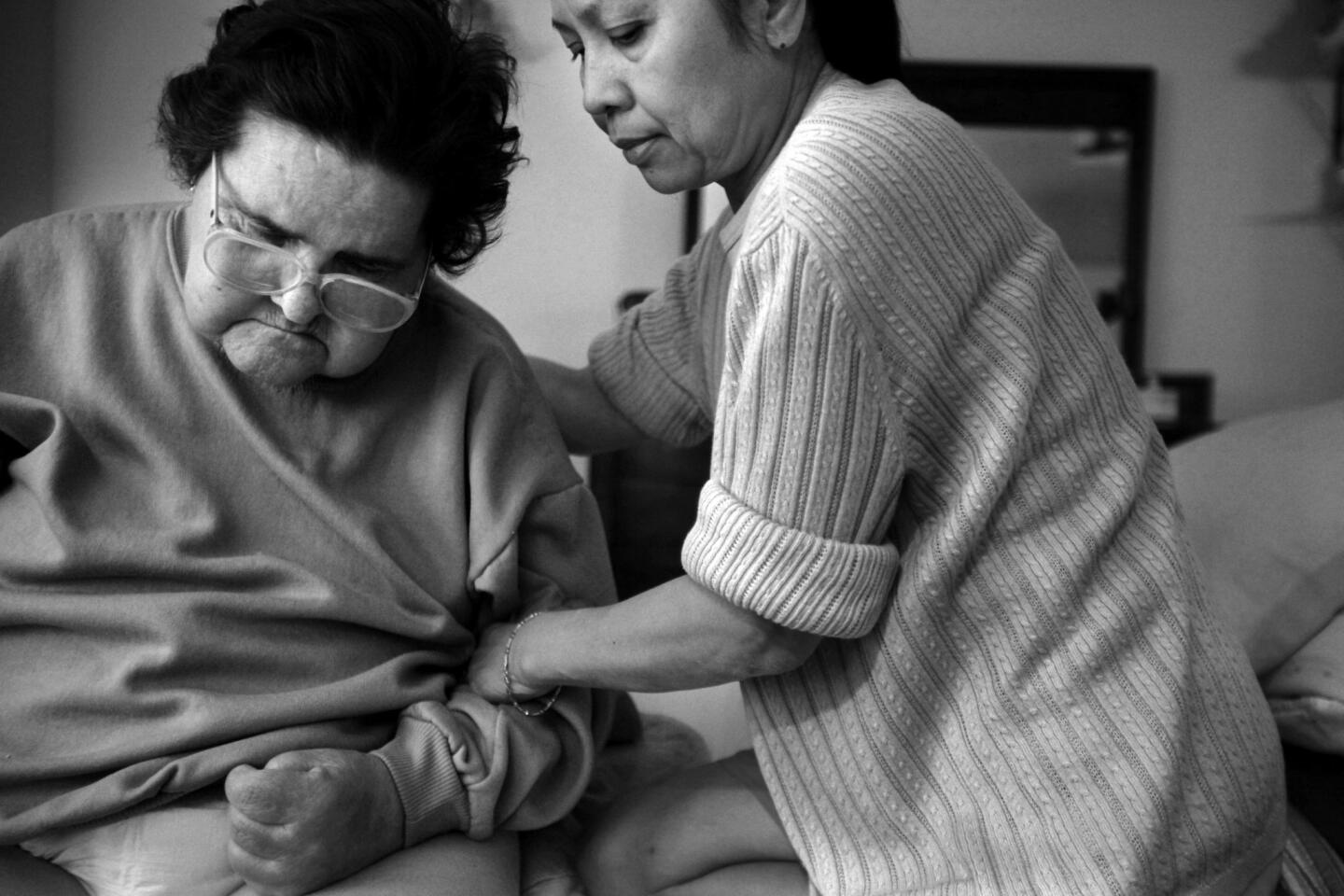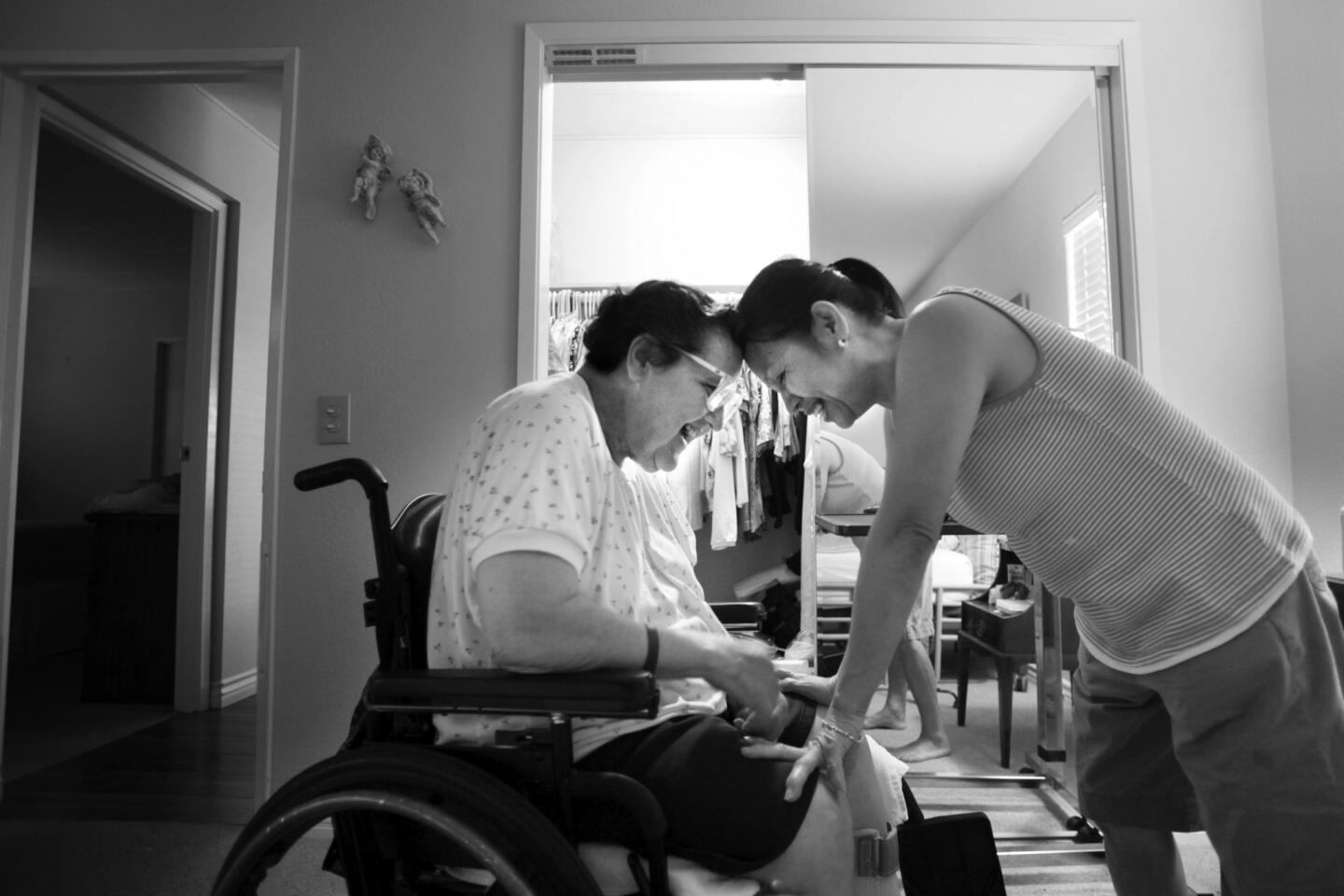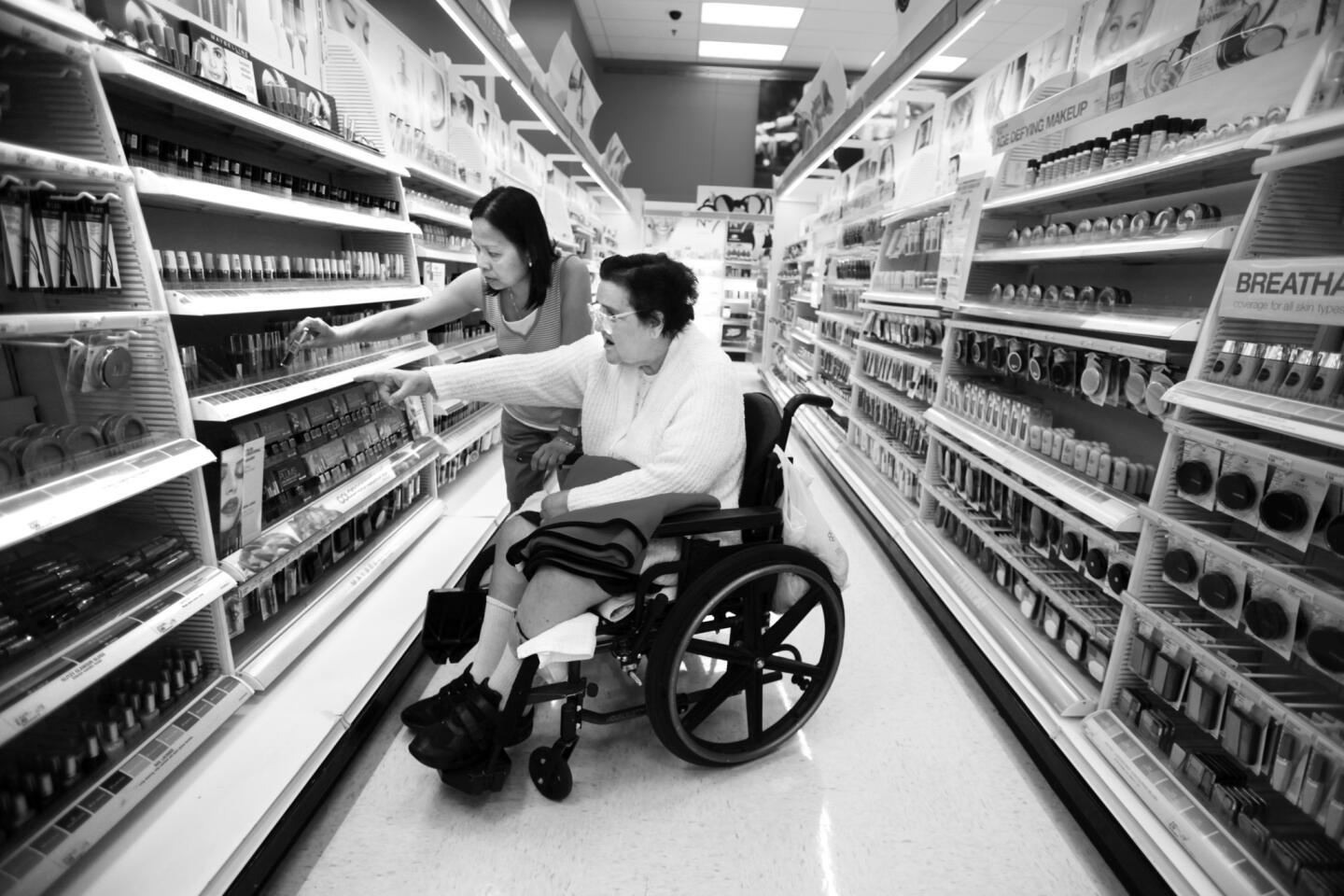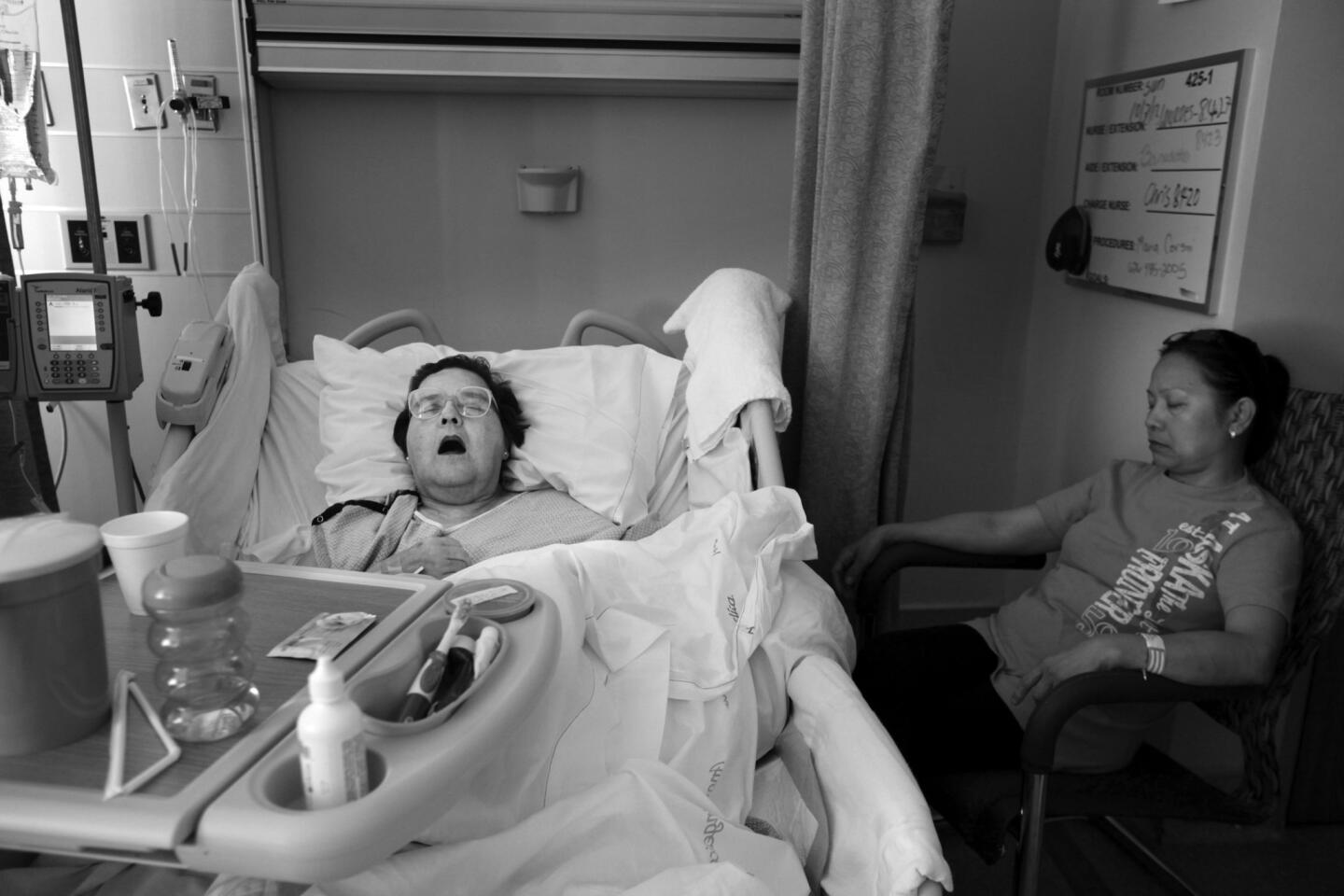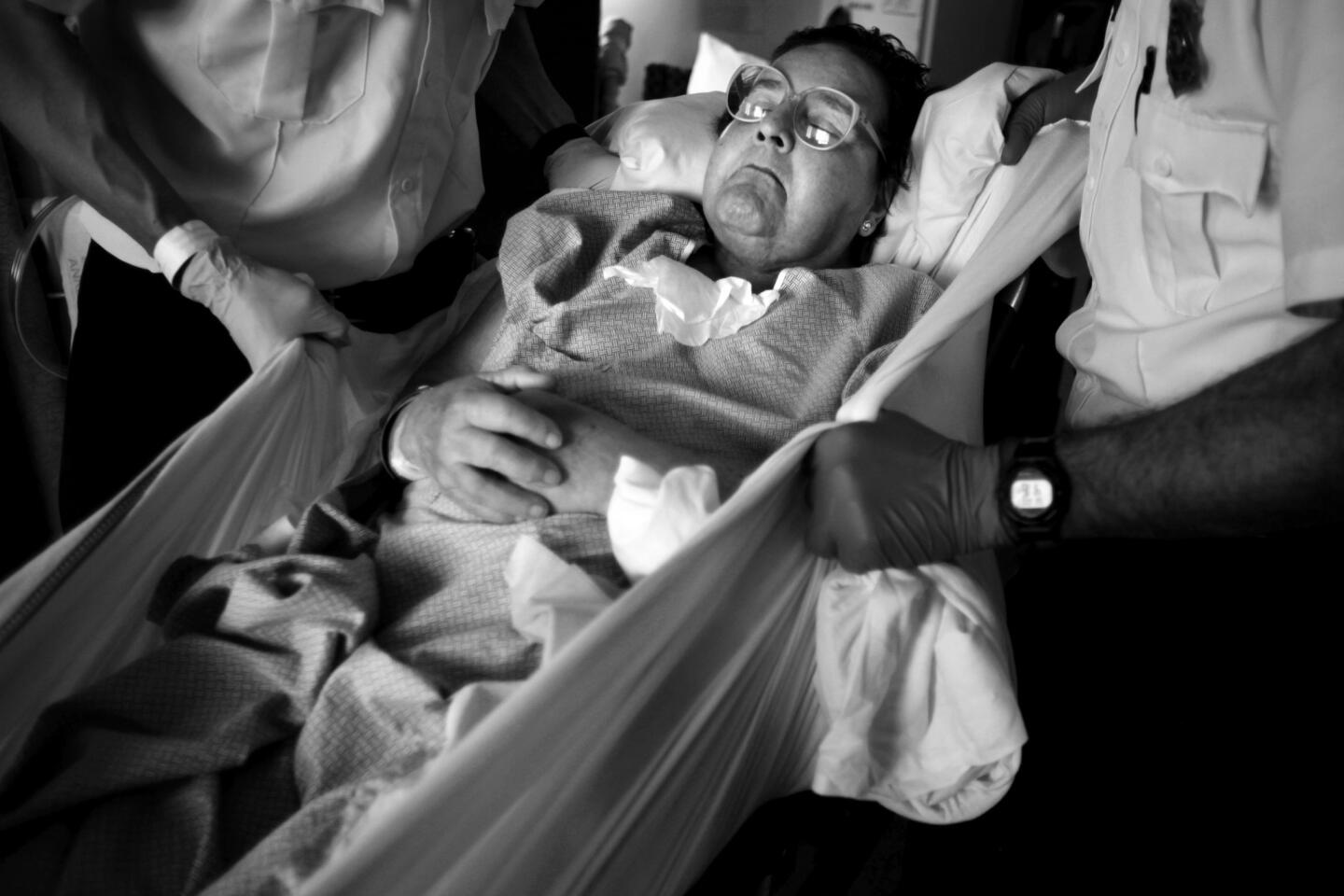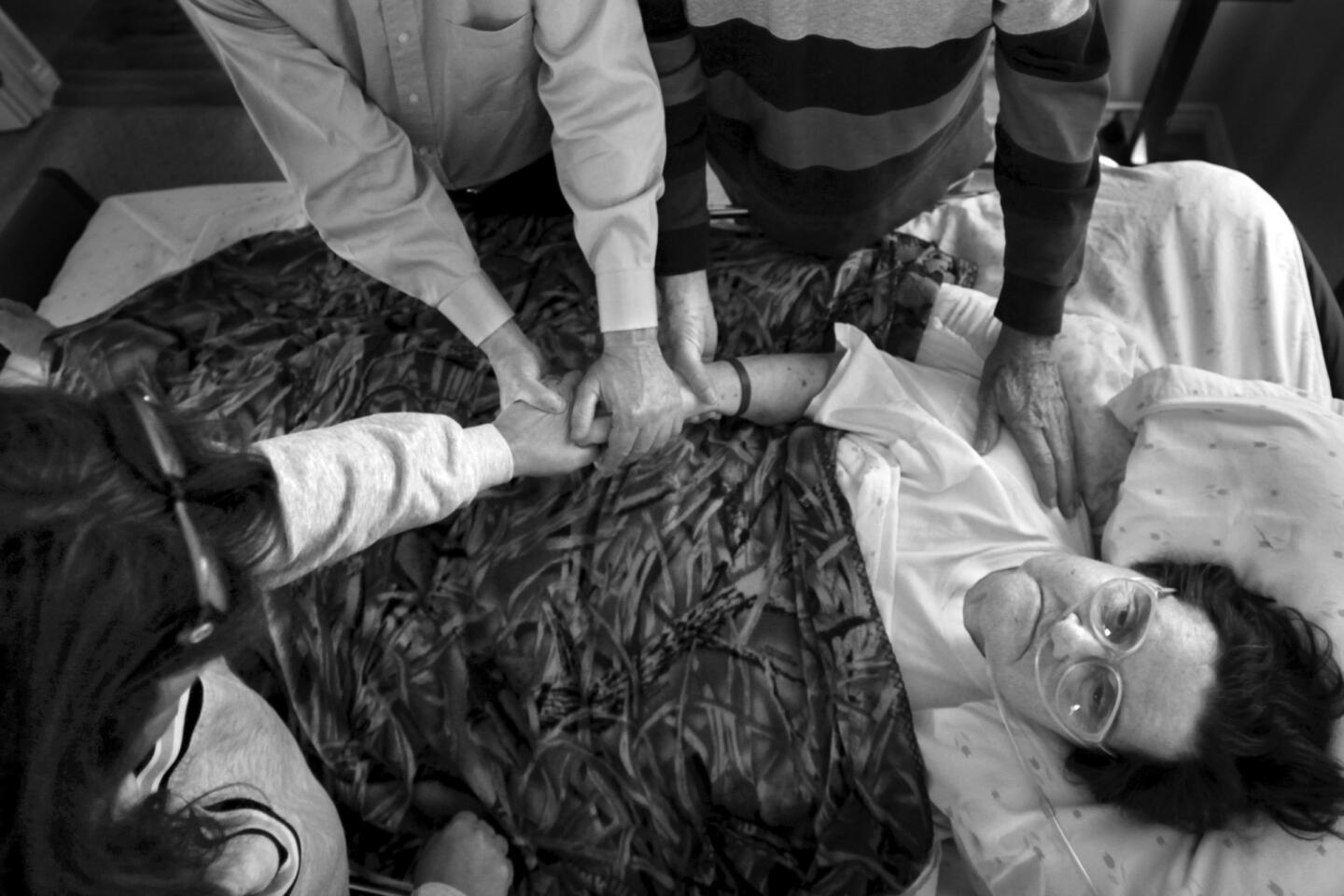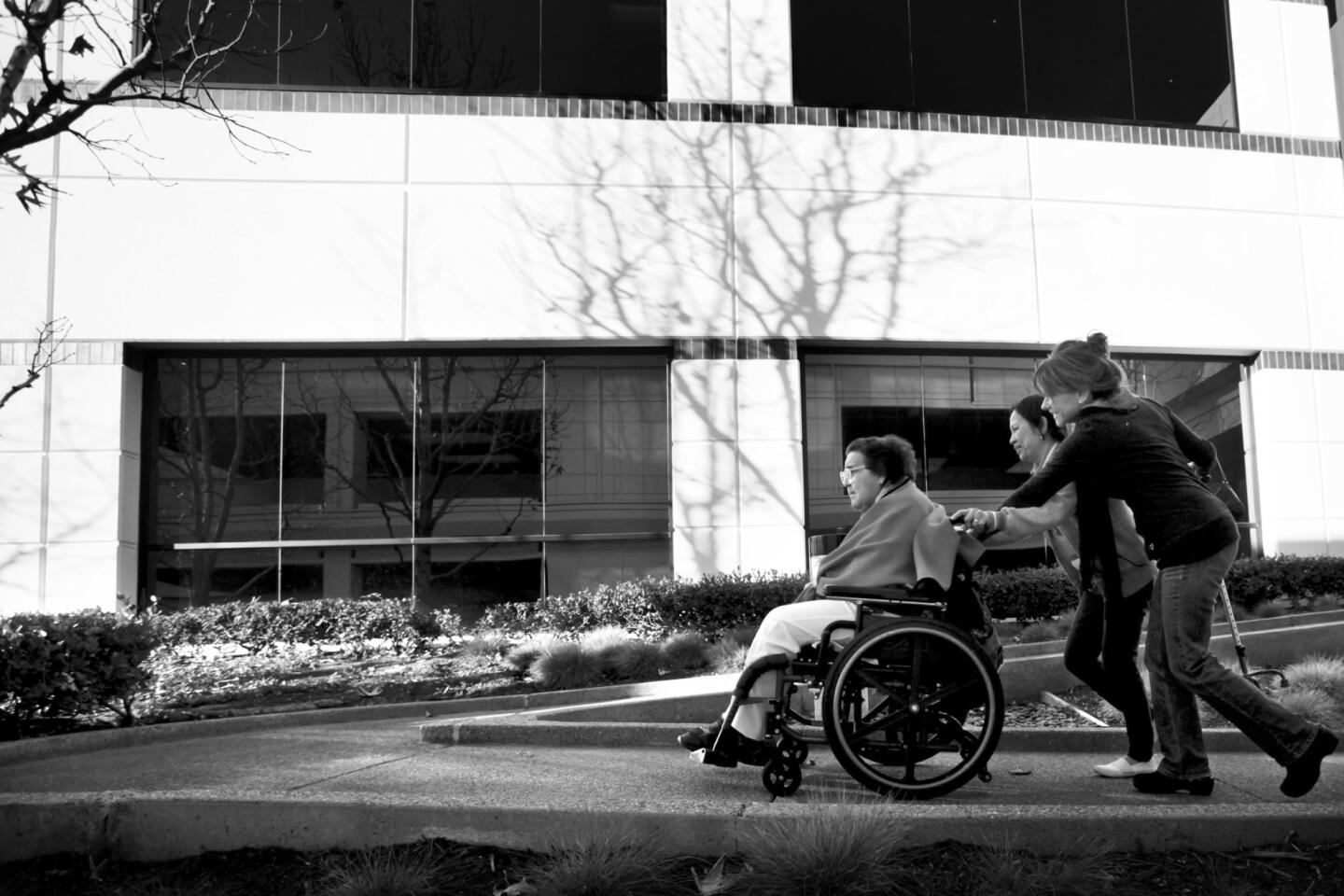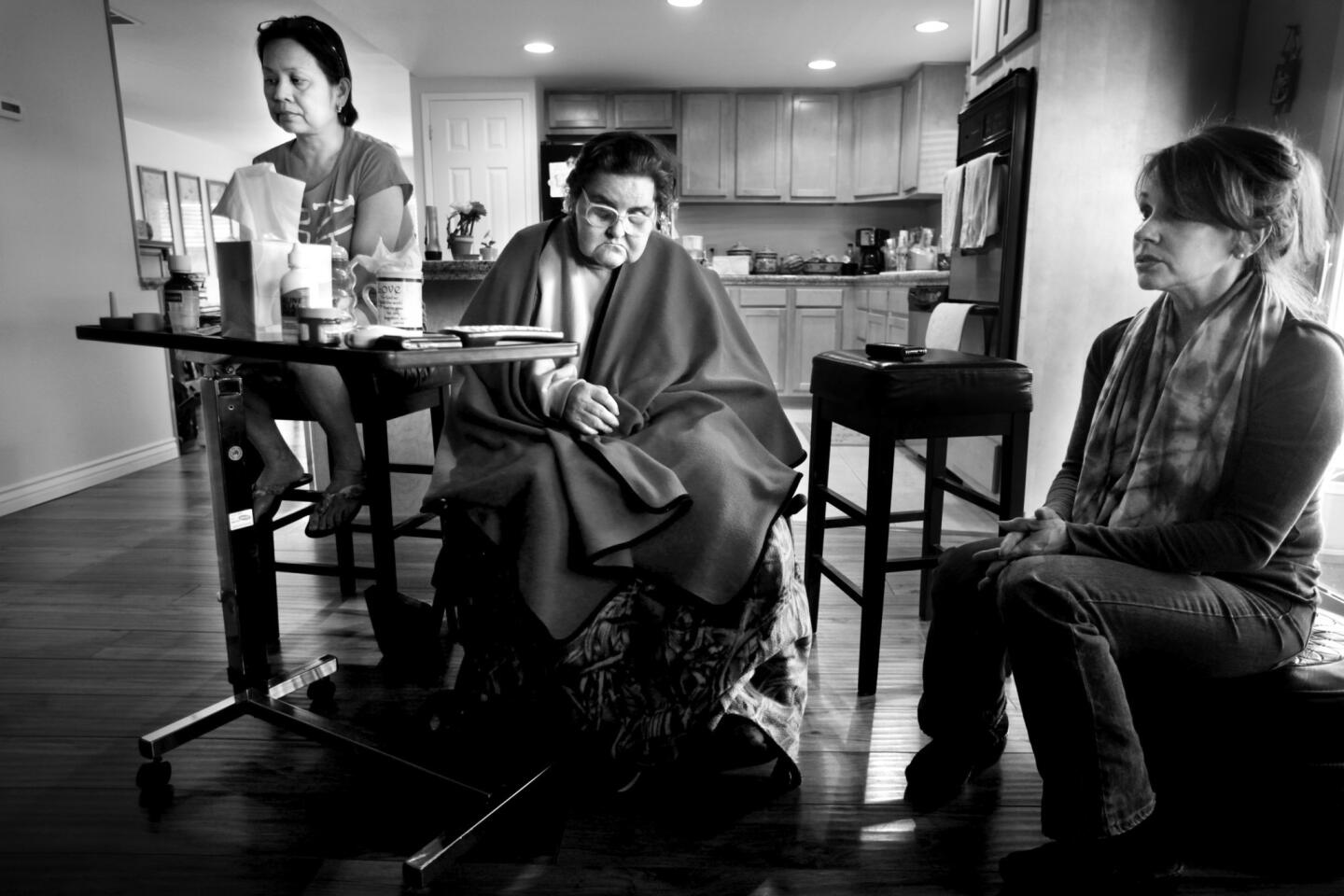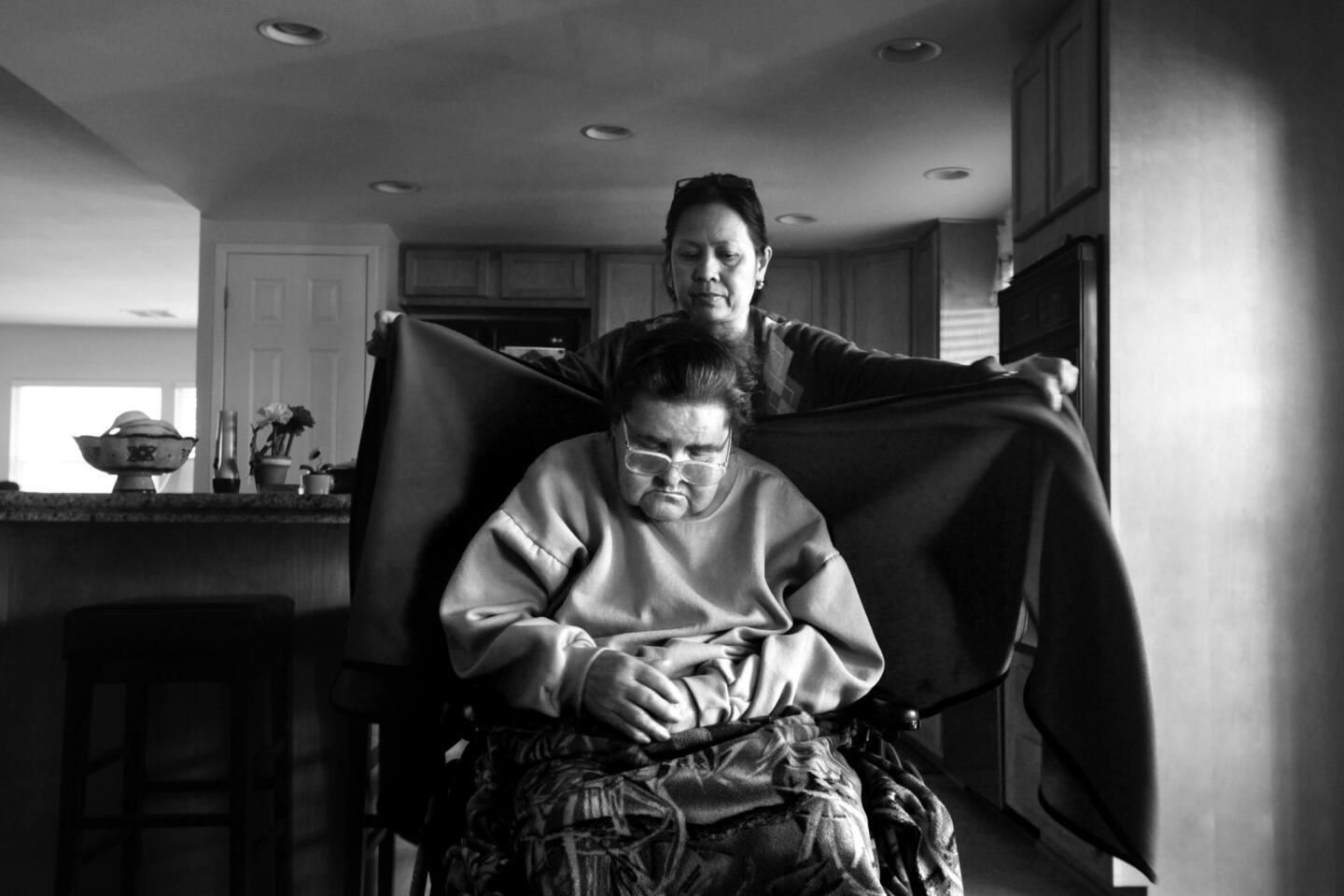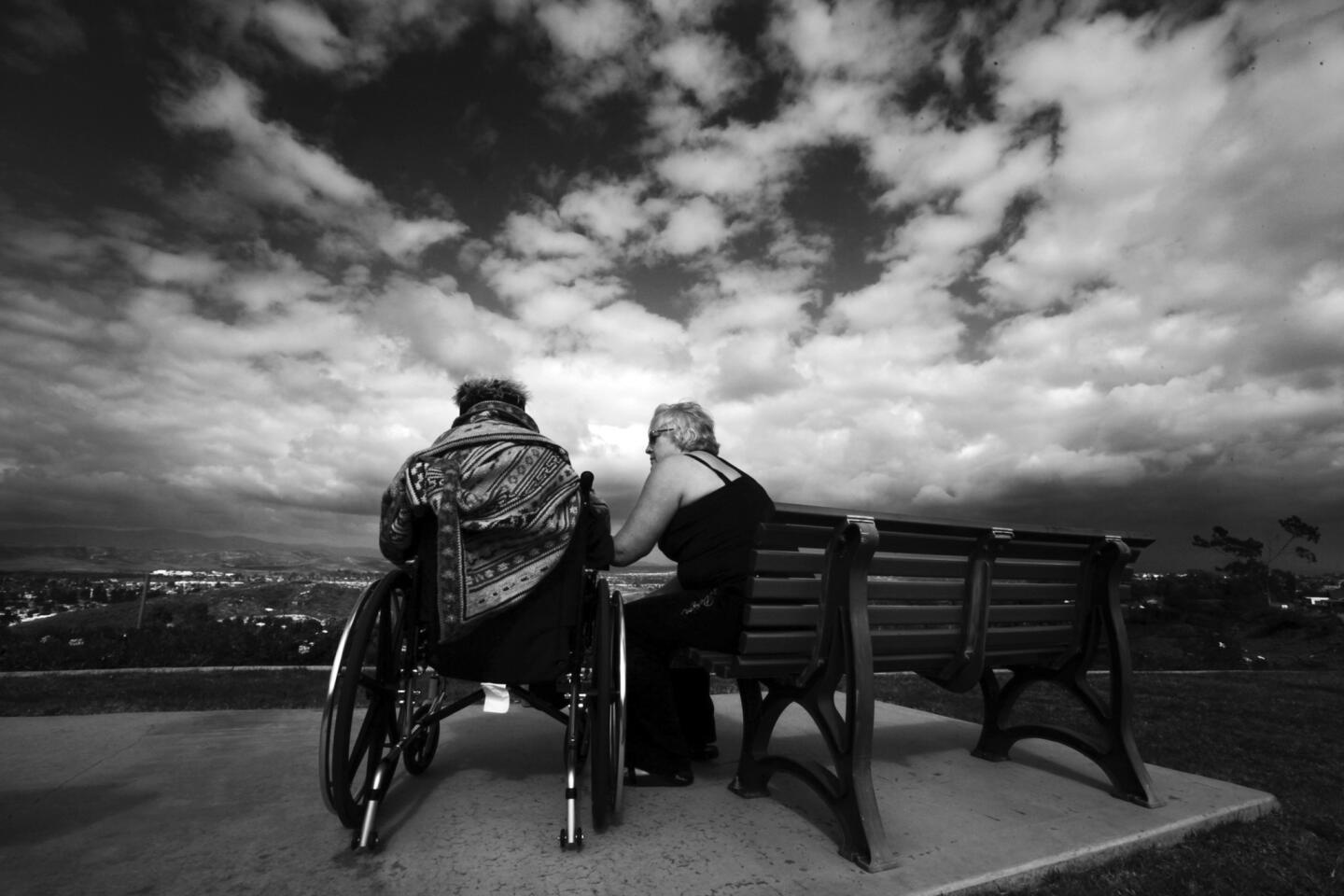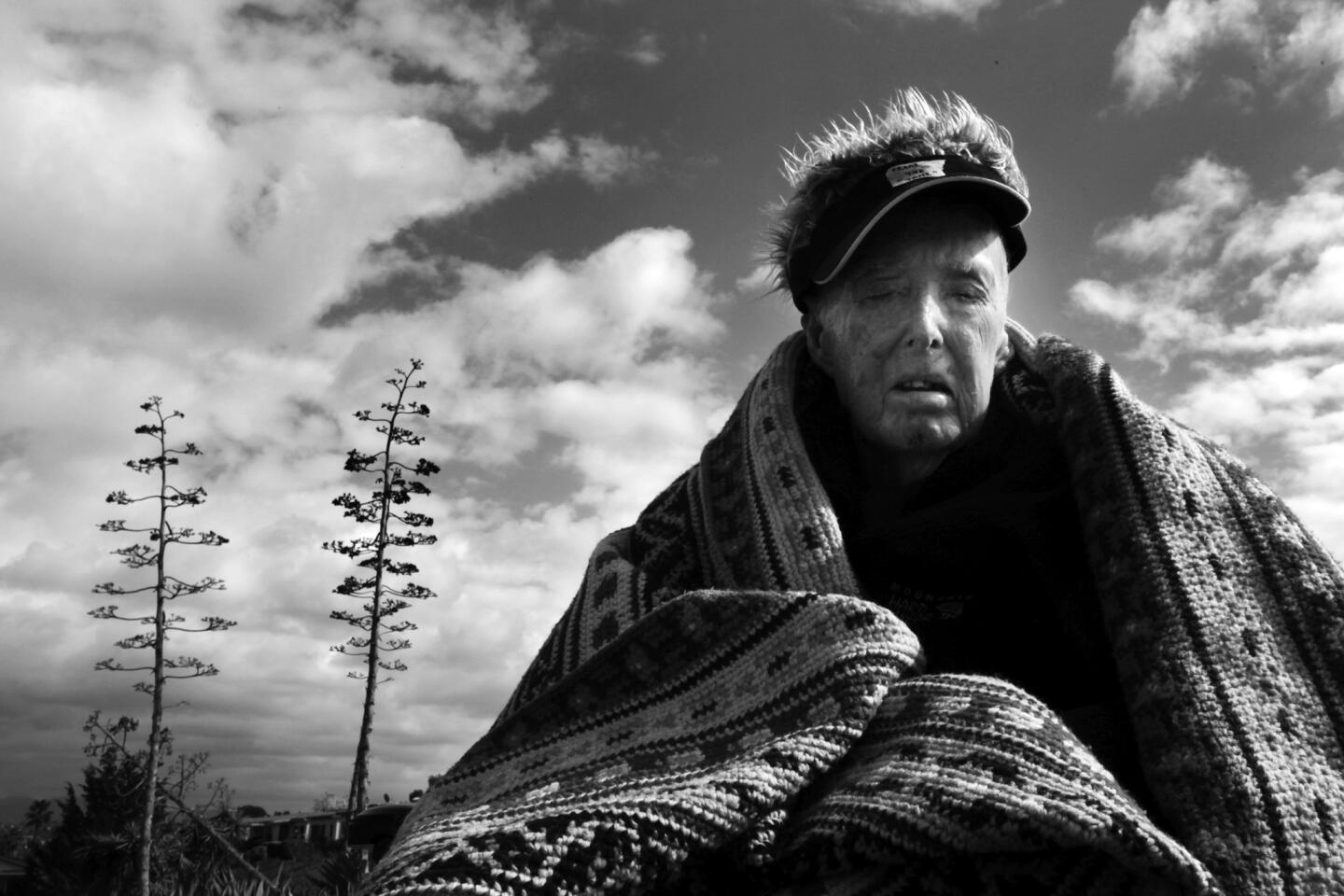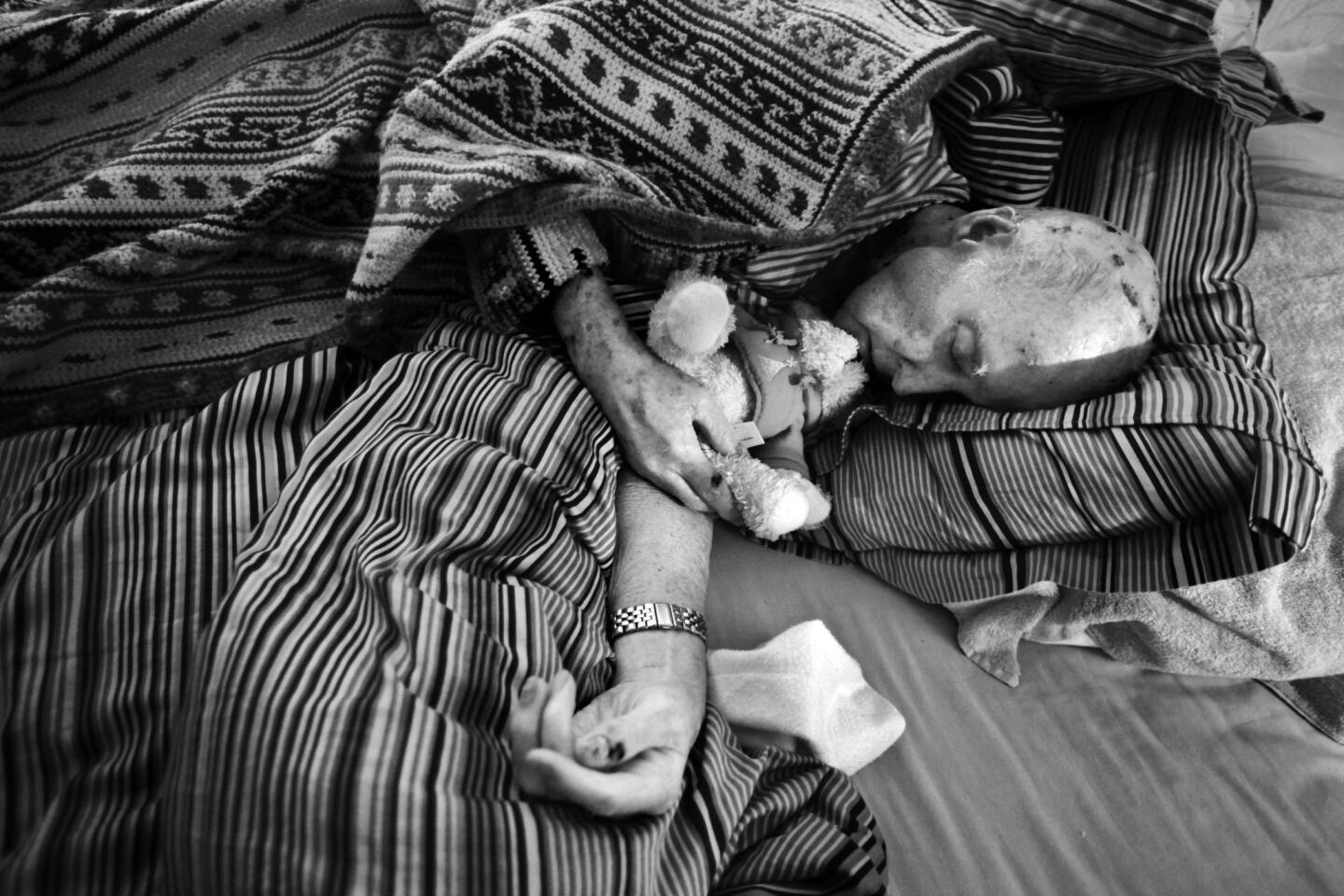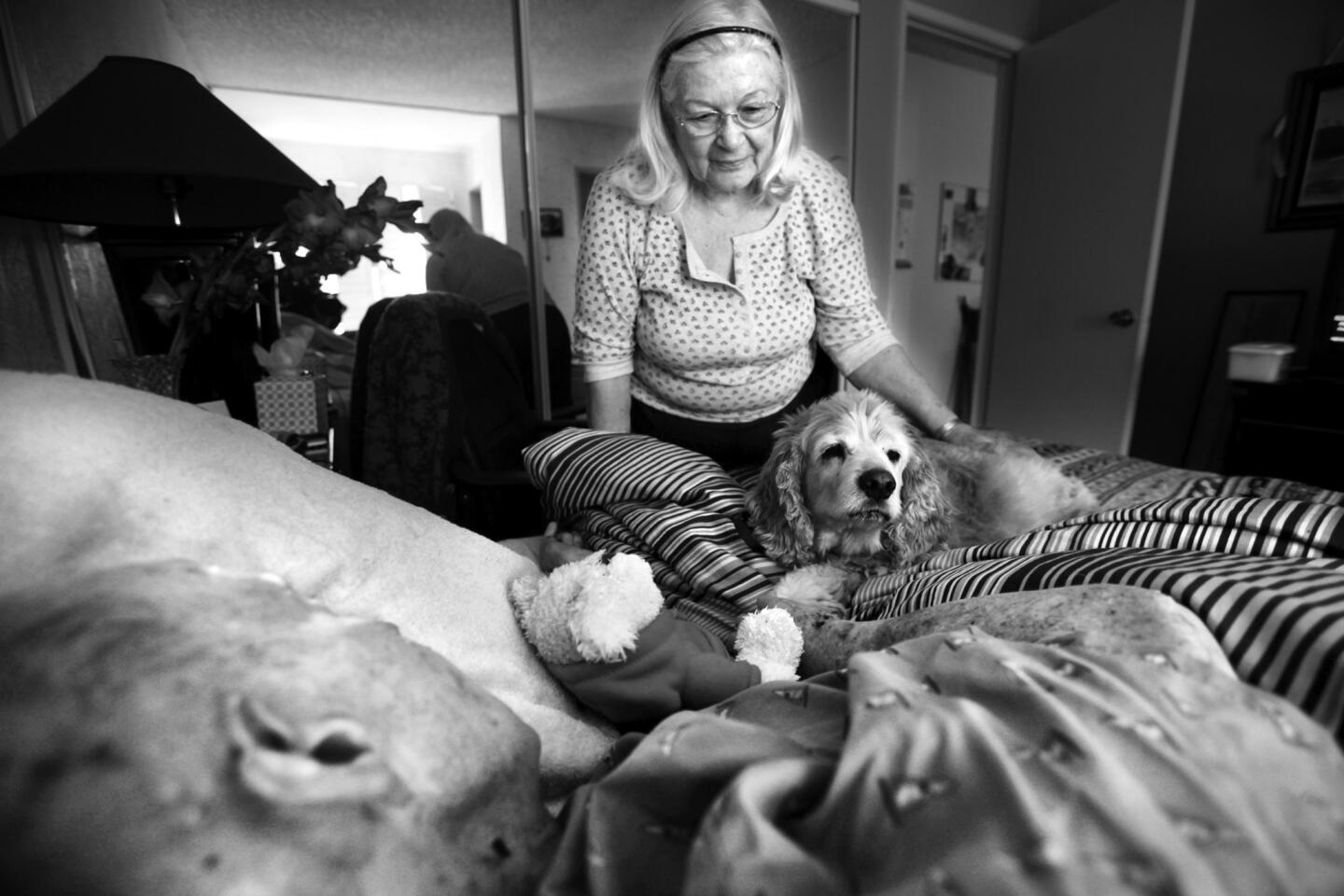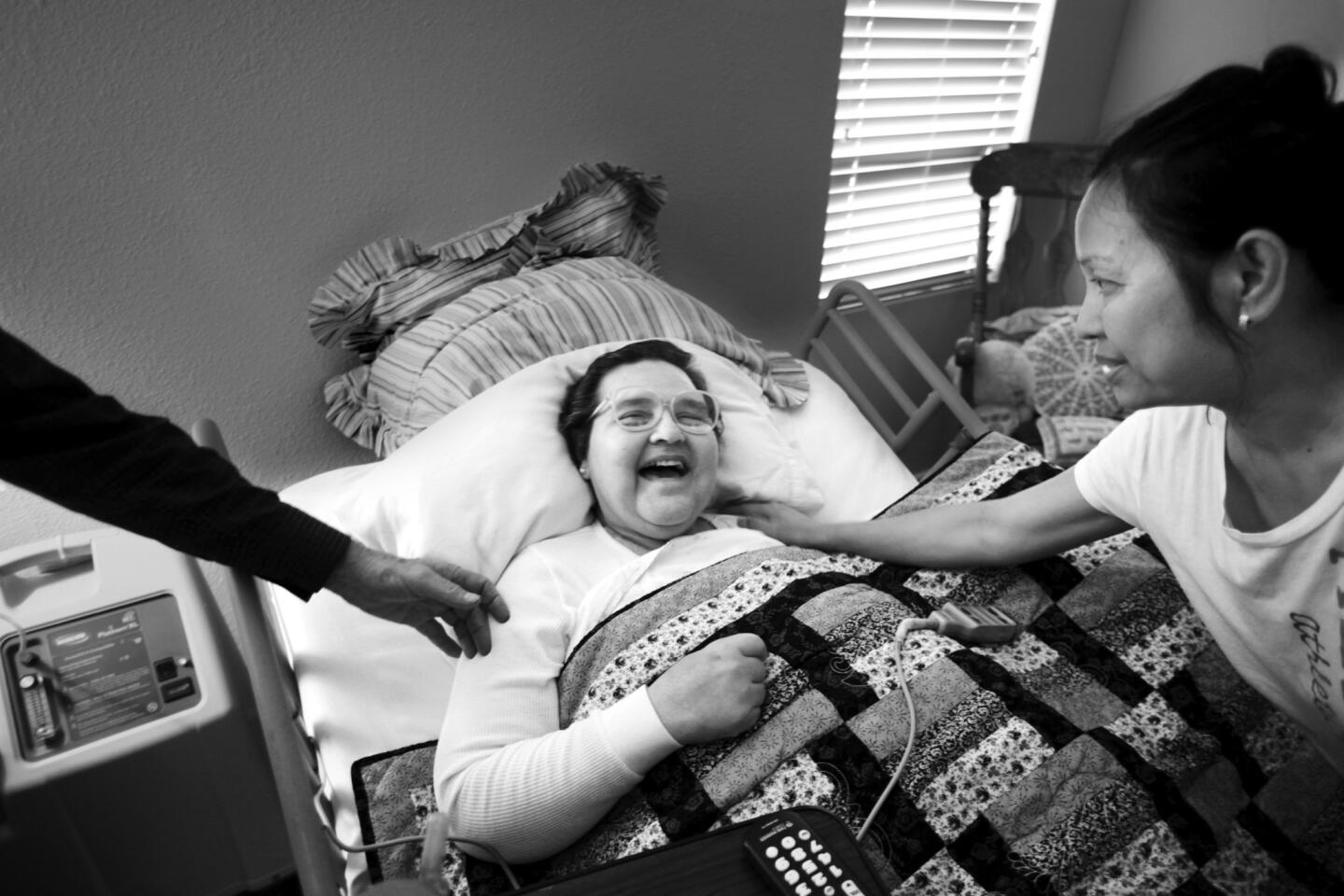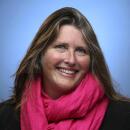Great Read: Nearing death, two people offer a journalist and caregiver life lessons
- Share via
Evelyn pulled her wheelchair close to the bathroom sink and went through her morning ritual. Combing her black hair. Brushing her false teeth. Putting on her makeup.
“Sit down, I want to talk with you,” she said.
I sat on the closed toilet seat, two cameras on my lap, ready to photograph her, as I had so many times before.
“How’s your dad?” she asked.
“He is not well,” I said. “He is struggling.”
She stopped applying her makeup and turned to me. “Look. He is likely not going to make it, and you’re going to have to be OK with that.”
It was classic Evelyn, blunt and to the point. Her lipstick done, she rolled her wheelchair slowly backward, then reached over and flicked off the light. “Didi, come get me,” she called to her caregiver, who was cooking breakfast.
She left me sitting there, alone. She had just said what the doctors would not. My father was dying.
::
I had met Evelyn Corsini in the summer of 2012. She was 82 and paralyzed on her left side following a stroke and the removal of a brain tumor. She had many chronic illnesses, but still lived in her own home in LaVerne with 24-hour care that her family stitched together.
I wanted to document the emotional impact of caregiving on families, and the Huntington Senior Care Network in Pasadena suggested Evelyn. She agreed to participate even before we met.
My interest in the subject was journalistic but also personal: As the caregiver for my father, I had been living the story for more than a decade.
On the morning we met, Evelyn was lying on the bed and, with Didi’s patient guidance, doing her stretching exercises, first her arms, then legs. Didi helped her rotate to the edge of the bed so she could stand up. With a brace on her left leg and a cane in her right hand, she was able to slowly walk to the bathroom alongside her petite caregiver.
Evelyn trusted me to document everything, even allowing me to photograph her being bathed by Didi that first day.
We hit it off immediately. I told her my mother’s best childhood friend had been named Evelyn. She liked that.
Born and raised in New York, Evelyn moved to Los Angeles with her husband in 1950 and raised their six children in Temple City and Rosemead. She worked as a key-punch operator until her retirement in the 1990s.
She loved opera. Growing up, her children heard her sing around their home. Her voice would later be weakened by the stroke, and she could no longer sing in her church choir. Still, you knew when she was happy, because she hummed to herself.
She liked to argue politics and would impress with her knowledge of history and cinema. (She loved action adventure movies, which always amused me.) She read the newspaper and Bible every day after breakfast.
I was there to photograph the good days and the bad. I tagged along for doctor appointments, trips to Stater Brothers, runs to Target for lipstick.
Every night her daughter Marguerita — Evelyn called her “Mugzie” — would phone and ask for a nightly blessing in Spanish.
“They have been so good to me,” she said of her children.
Evelyn told me she felt useless because of her frailty. Sometimes, she cried. Sometimes, she felt unworthy.
“I ask, why did God let me live this long?” she said. “My son Michael told me it’s because I have a purpose. I am still waiting to find out, but whatever it is, I am ready, willing and able.”
::
In time, the usual barrier separating journalist and subject began to soften. One day, we start talking about my father, Frank Orr.
For three decades he had lived with chronic illness. Time and again, he surprised his doctors, even outliving some who predicted he wouldn’t make it to 50.
At 48, following surgery, he came down with a rare infection in an artery and hemorrhaged several times. He subsequently lost his left leg because the artery wouldn’t heal. Sometimes he was hit with debilitating phantom pain.
Dad was 78 when I met Evelyn. He had heart disease, two non-malignant forms of skin cancer and polycythemia vera, a blood disorder. It caused enormous blood clots; other times he would hemorrhage because of the blood thinner.
Then, four months after I met Evelyn, he was diagnosed with Merkel cell carcinoma, a rare and aggressive form of skin cancer.
But his identity was that of “the survivor,” capable of rebounding after any health crisis. He lived independently in Oceanside, with my help, and he had great neighbors and friends. I would shop, research health information, take him to doctor’s appointments, help out with banking. I would sit with him in the hospital and clean his wounds when he came home after surgery.
“You’re such a good daughter,” people would say. But I felt like a fraud.
I was getting burned out by my father’s long suffering. It felt like I was living with a low-grade fever — the lagging energy, the unending worry. At times, my reservoir of compassion began to dry up.
I could listen to Evelyn for hours. It was easier for me to be patient with her than with my father.
I wanted him to be independent, but also safe. He wanted that too. But he was damn stubborn and we argued often.
I’d get him a new coat, or new shoes. He didn’t want them. We hired someone to cook for him. He let her go. He had Meals on Wheels, but eventually canceled it.
I didn’t understand how my father could be so charming in the doctor’s office — he had beautiful blue eyes and would flirt with the nurses — and yet so argumentative with me.
One day we started fighting in his kitchen. “You have to eat!” I demanded. He said he couldn’t. Then he yelled back. “Just let me lead my own life!”
He had had two surgeries to remove tumors from the back of his head. Even then, he needed 33 rounds of radiation treatment.
In a panic, I told him he had to eat if he wanted to continue the radiation treatment. I found myself yelling: “I am never going to give up on you. You need help. This situation is hurting me too.”
Then we stood there, crying, and holding each other.
::
Evelyn told me what my father could not: what it’s like to lose your independence.
“Complete loss. Complete loss,” she said. “I can’t cook for myself. I can’t get out of this chair and help anyone. “
She also spoke of compassion, and the capacity to help others. Have patience, she told me, and slow down. Just be there for him, she said. Just be there.
She reminded me to care for myself and of simple joys, like food. Didi prepared custard with a recipe from Evelyn’s mother. She loved that. Evelyn and Didi spent hours planning meals together. Meatball soup was one of the favorites.
I would try some of their recipes on my father, and Evelyn expected a report back on how he liked the dish. He particularly liked the soups and the meatballs. I think the sound of me rattling around in the kitchen was comforting. I enjoyed it too.
By mid-November 2012, her daughter Maria called to say Evelyn was struggling. She had been hospitalized with sepsis, a dangerous blood infection. Her kidneys were beginning to fail, and she returned home very weak.
Evelyn was evaluated for hospice care, and qualified.
::
I stood by the partially closed door to my father’s bedroom, listening. He usually was awake by this hour and I hesitated before opening the door.
He was on his left side, facing me. Was he breathing? He opened his eyes and asked me to lie next to him. I took off my shoes and climbed in.
He held a little bear I had given him for comfort, and was wrapped in a swirl of color — a friend’s handmade afghan. “Hold my hand,” he whispered, and I did. I couldn’t remember holding his hand since I was a little girl. We said nothing, and he drifted off to sleep.
Over the next several weeks, I would climb into bed with him and tell stories — how we drove across the plains of Kansas when I went off to college, or the sound of running water in Cold Creek Canyon in Colorado, where he used to take me fishing when I was a kid.
One night, I reminded him how every day he and his little dog, Bentley, would go to the “point,” a bluff overlooking Oceanside. Neighbors gathered there and friends would bring treats — baby carrots for Bentley. I didn’t know if he was listening.
Later, he woke up in the middle of the night and said, “I have cancer. I can’t go outside.”
“You can do anything you want,” I assured him. “I’ll take you.”
The next afternoon, my cousin Rae Ann, who was helping me with my father in addition to hospice care at that point, told me that he was demanding to go outside.
By then my father wasn’t able to sit up by himself. Yet here he was, trying to stand. We bundled him into his wheelchair — he had lost so much weight my cousin easily lifted him — and set off down the road.
He kept directing us where to go. Finally, we reached the “point.” It was a beautiful, clear afternoon, and we sat there together. After 15 minutes, he was done, and my cousin pushed his wheelchair past blossoming trees that I had never noticed before.
When my father was back in bed, he asked, “Do you want me to die?”
No, I told him, I didn’t want him to die. But I couldn’t take his suffering any longer and I told him he would be at peace now, if that was what he wanted. I asked for his forgiveness for my impatience, and he asked for mine.
He died two nights later, one day before his 79th birthday, on Feb. 11, 2013.
:
After my father died, I didn’t know where else to go. I went to Evelyn.
She too had been growing weaker. Her best friend, Rosemary, sang to comfort her, and Evelyn tried to join in, but she was too weak.
In the end she could barely speak. Evelyn whispered to Maria that she didn’t want dialysis. Maria looked up at me, then back at Evelyn. “It’s OK, Mom. It’s OK, you don’t have to have it.”
I never told Evelyn my father had died. She would have worried about me.
When she asked how we were both doing. I simply said, “We are doing well, Evelyn. Thank you. You would be proud of us.”
Then she would smile.
She died at home in the middle of the night on March 22, 2013.
I had often asked Evelyn why she allowed me into her life.
She said, “If I can help just one person, it’s worth it.” I would smile, and say, “You already have. You helped me.”
It’s more than a year now since Evelyn and my father died. Some days I feel completely broken. Other days I feel like the weight of grief is lifting.
I keep coming back to the lessons I learned from my father and from Evelyn.
Love. Forgive. Be present. And then let go.
More to Read
Sign up for Essential California
The most important California stories and recommendations in your inbox every morning.
You may occasionally receive promotional content from the Los Angeles Times.
